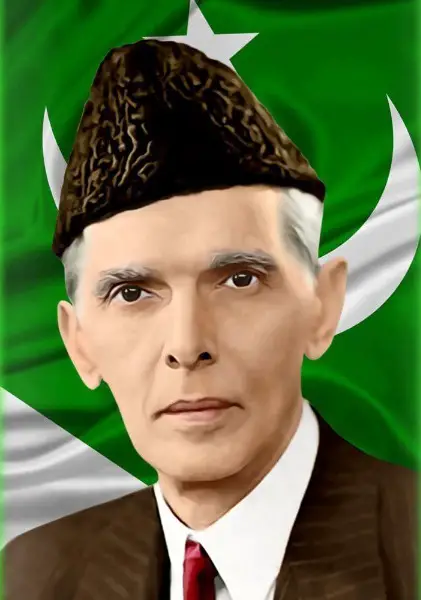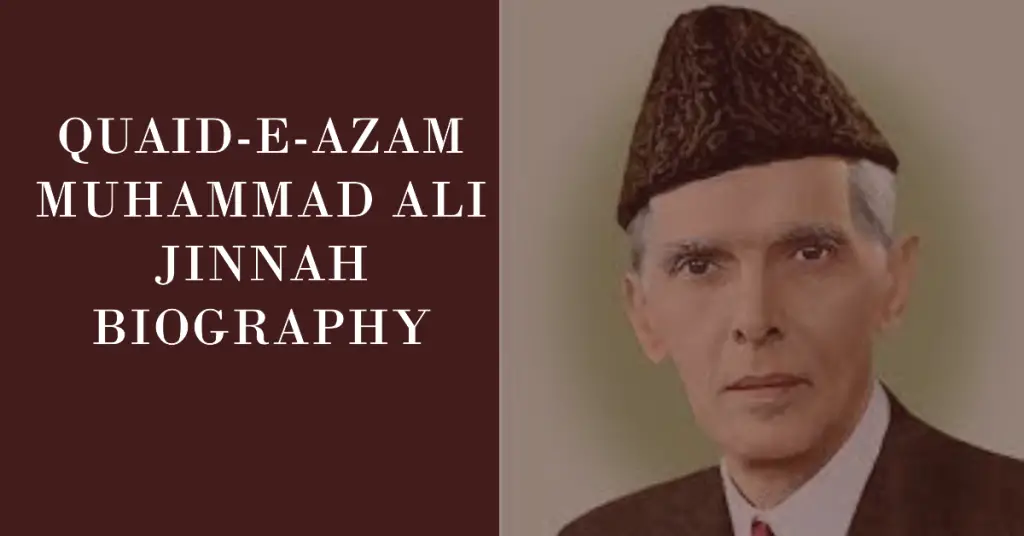Muhammad Ali Jinnah served as the founder of Pakistan and its first Governor-General. Revered in Pakistan as Quaid-i-Azam (“Great Leader”) and Baba-i-Qaum (“Father of the Nation”), Jinnah is considered one of the most influential and respected leaders in South Asian history.
Through his political leadership and legendary speechmaking, Jinnah catalyzed the nationalist movement seeking an independent Pakistan. His visionary advocacy and relentless drive led to the realization of Pakistan as a homeland for South Asia’s Muslims.
Early Life & Background
Jinnah was born on December 25th, 1876 in Karachi, then part of British-controlled India. His family had moved to Karachi shortly before his birth.
Key Details:
- Full Name: Muhammad Ali Jinnah
- Also Known As Quaid-e-Azam, Baba-i-Qaum
- Date of Birth: December 25th, 1876
- Place of Birth: Karachi, British India (modern-day Pakistan)
- Parents: Jinnahbhai Poonja (father), Mithibai Jinnah (mother)
- Siblings: 6 siblings (2 sisters, 4 brothers)
Jinnah came from a prosperous merchant-class family. Both sides of his family had converted to Islam several generations earlier. His father, Jinnabhai Poonja, was a prosperous merchant.
Growing up, Jinnah lived for a time in Bombay with an aunt and uncle who enrolled him in the Sindh Madrasatul Islam School. Jinnah later attended the Christian Missionary Society High School, where he excelled in academics.
Education in London, U.K.
In 1892 at age 16, Jinnah’s parents arranged for him to marry a girl named Emibai in Karachi. Shortly after, Jinnah’s mother died which greatly impacted him emotionally. His father decided to send the heartbroken Jinnah to study abroad and expand his opportunities.
Studying Law in England
Later that year at age 16, Jinnah sailed for London, England to begin his higher education. He planned to pursue his long-held ambition of becoming a barrister.
Over the next few years living in London, Jinnah:
- Attended the Graham Street Established School
- Enrolled at Lincoln’s Inn to prepare for the law program
- Completed his formal legal training with Honors
By age 19 in 1895, Jinnah left London having become the youngest South Asian barrister ever to practice in England. His drive, intelligence, and determination powered his success as a lawyer then and throughout his career.
Key Accomplishment
- 1895 – Becomes youngest ever Muslim barrister in London at age 19
Early Legal Career Back in India
Armed with prestigious legal credentials from London, Jinnah returned home to British India to embark on his professional career at age 20.
He built up a successful practice working as a barrister and advocate in Bombay and Karachi over the next 15 years. This experience as a lawyer served as the underpinnings for his legendary future political negotiations.
Major Career Milestones:
- 1896 – Opens legal practice in Bombay after studying local politics and law
- 1897 – Gains notoriety winning high-profile case, Daver vs. Shamji
- 1906 – Moves practice to Karachi after damage in Bombay from plague
- 1908 – Jinnah gains membership in the Imperial Legislative Council
Jinnah earned a formidable reputation for his sharp legal mind and rhetoric. His flourishing career brought good fortune and prominence among India’s elite professional class circles.
Personal Life & Marriage
Jinnah endured several personal losses during his early adulthood, including his wife dying shortly after their marriage. But in 1918 at age 42, he found love again and remarried.
Marriage to Emibai
Tragically, Jinnah’s young wife Emibai died from illness shortly after he finished law studies in London in 1894. Her death deeply grieved the typically stoic Jinnah during this formative time in life.
Marriage to Rattanbai “Ruttie” Petit
Two decades later while living in Bombay in 1918, Jinnah met Rattanbai “Ruttie” Petit, the 16 year old daughter of a wealthy Parsi businessman. They fell deeply in love and married later that year despite controversy over their age difference and religious differences.
Spouse & Children
| 1st Wife | Emibai Jinnah |
| 2nd Wife | Maryam Jinnah (Ruttie Petit) |
| Children | 1 daughter, Dina Jinnah |
Ruttie converted controversially from Zoroastrianism to Islam. The interfaith marriage caused a lasting rift between Jinnah and Ruttie’s father. Ruttie died young at just 29 years old in 1929 likely from cancer, leaving behind their only daughter, Dina.
Rise as Muslim Nationalist Leader
During the early 1900s, Jinnah began participating more substantially in India’s growing political sphere by attending the annual session of the Indian National Congress. He advocated for Hindu-Muslim political unity and nationalist self-government over British rule.
Shift Toward Muslim Interests
Over ensuing years, Jinnah switched from the Indian Congress to focusing on safeguarding Muslim political interests amidst rising tensions with India’s Hindu majority population.
Key events shaping his thinking included:
- 1906 – Muslim League political party formed
- 1909 – Minto-Morley reforms establish separate Muslim electorates
- 1916 – Lucknow Pact -Jinnah negotiates Muslim rights
Jinnah believed the subcontinent’s Muslims should have their own self-determination path, separate from India’s proposed independence from Britain.
This thinking aligned with Muhammad Iqbal, an influential philosopher and eventual spiritual father of Pakistan. Iqbal championed widespread Muslim political unity across India to achieve a homeland.
1937 – Bombay Presidency Muslim League Session
In 1937, Jinnah was elected president of the Muslim League during a pivotal session held that year in Bombay. In his presidential address speech, Jinnah expressed:
“Hindus and Muslims could never become one nation because their philosophy of life is diametrically opposed.“
This controversial speech marked Jinnah’s full embrace of Iqbal’s earlier espoused Two-Nation Theory that Hindus and Muslims constitute separate nations who could not live in one state.
Key Implication:
- Jinnah’s presidency over Muslim League led to him guiding efforts toward establishing Pakistan.
Pakistan Resolution & Independence Movement
With rising tensions and violence stirring between religious groups amidst the chaos of World War II, Jinnah led the call for an independent Pakistan as President of the League.

1940 Lahore Resolution
In 1940 at the Muslim League session held in Lahore, the Muslim League adopted the Lahore Resolution memorializing the first official demand for an autonomous state for India’s Muslims. Jinnah spearheaded crafting this influential resolution.
The Lahore Resolution stated:
“No constitutional scheme would be workable in this country or acceptable to the Muslims unless it is designed on the following basic principle, namely, that geographically contiguous units’ areas in which the Muslims are numerically in a majority, as in north-western and eastern zones of India, should be grouped to constitute independent states.
While not explicit, this resolution planted the seeds calling for an independent Muslim state to be carved out alongside a separate Hindu state once the British Raj ended. This Lahore Resolution marked a pivotal shift toward realizing Pakistan.
Key Details:
- Moved By: A.K Fazlul Huq (on behalf of Jinnah)
- Session Location: Manto Park, Lahore
- Date Passed: March 23rd, 1940
1946 Election Victory & Cabinet Mission Plan
Buoyed by electoral victories in 1946 provincial elections, Jinnah announced the Muslim League’s readiness to form Pakistan’s first government and frame a constitution.
Meanwhile, the British dispatched a special Cabinet Mission to decide arrangements around India’s transition to independence. Despite initial opposition to Pakistan’s creation, Jinnah entered fierce talks with the Mission. His legendary negotiation skills produced a compromise plan granting Pakistan statehood.
1947 Independence Celebration
With the partition of India assured by 1947, Jinnah prepared for Pakistan’s August 14th independence milestone as the first Governor General of the new state and ceremonial head of government.
Jinnah famously stated in speech to Pakistan’s Constituent Assembly on the eve of independence:
“You are free; you are free to go to your temples, you are free to go to your mosques or to any other place of worship…You may belong to any religion or caste or creed-that has nothing to do with the business of the State.”
This speech outlined his vision for equal rights and religious freedom in the newly formed nation. Jinnah upheld secularism politically despite his personal Muslim faith.
Post-Independence Pakistan
Jinnah led Pakistan during its challenging infancy phase as millions migrated between the split nations and violence erupted. His central leadership proved crucial holding the administration together.
Major Milestones:
- 1947 – Pakistan gains independence on August 14; Jinnah becomes 1st Governor-General
- 1948 Declaration of Rights of Pakistani minorities signed
- 1948 – Inaugurates State Bank of Pakistan to issue currency
- 1948 – Establishes Pakistan’s Naval Headquarters
However, Jinnah’s health sharply declined during 1948 likely from advanced lung tuberculosis. He withdrew from public view while continuing governmental leadership.
Death & Legacy
Muhammad Ali Jinnah died at age 71 on September 11th, 1948 in Karachi, only 13 months into Pakistan’s newfound independence.
His death triggered a major outpouring of public grief. He was hailed internationally as a revered founding father of Pakistan.
Lasting Legacy:
- Baba-i-Qaum – Honored as Father of the Pakistani Nation
- Quaid-e-Azam – Enduring title signifying his Great Leader status
- National Holiday – Pakistan observes Quaid-e-Azam Day annually on his birthday, December 25th
- Portrait Featured on Currency – Jinnah’s image etched on all Rupee banknotes and coins
Jinnah’s political stewardship and tireless advocacy spearheading Pakistan’s creation established him as the central founding force and Father of the Nation. He continues to embody Pakistani patriotic identity and values of religious freedom.
Pakistan likely would not exist without Jinnah’s vital leadership during its nationalist struggle. His brief term governing solidified lasting democratic tenants before death at the young but established nation’s helm.


